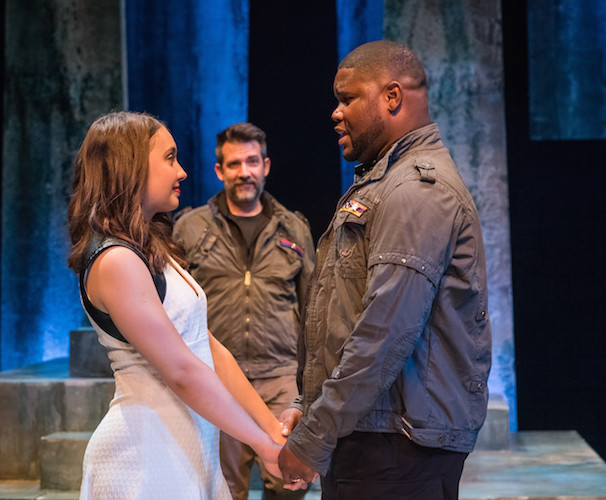Fuse Theater Review: ASP’s Compelling “Othello” — Taking a Different Tack
Against the tendency of many modern directors to make a heavy-handed statement with Othello, ASP’s Bridget Kathleen O’Leary chooses a more nuanced approach that hews closely to the text.
Othello by William Shakespeare. Directed by Bridget Kathleen O’Leary. Presented by Actors’ Shakespeare Project at the Modern Theater at Suffolk University, Boston MA, through October 25.

John Kuntz (Iago) and Johnnie McQuarley (Othello) in the Actors’ Shakespeare Project production of “Othello.” Photo: Stratton McCrady.
By Ian Thal
There is little need to summarize The Tragedy of Othello, The Moor of Venice. One of Shakespeare’s best-known plays, the script has long been used on the stage, on the screen, and in the classroom as a way to reflect on America’s racial issues. However, just as America’s understanding of race and skin color is different from that of Shakespeare’s England, America’s discourse on race has shifted a great deal, forcing us to reimagine the play’s meaning.
To the largely Anglo-Saxon populace of Shakespeare’s London, “black,” along with all its metaphorical connotations, represented a wide range of skin colors, including those swarthy tones that modern-day Americans would consider well within the range of “whiteness.” Likewise, “Moor” in Elizabethan parlance did not refer to a particular racial or ethnic group. It originated as a medieval European term for Berber and Arab Muslims from the Maghreb, Iberia, Sicily, and Malta. By Shakespeare’s time it was frequently used to refer to all Muslims (even those from the Indian subcontinent). It was also used to refer to all Africans. No group ever identified itself as “Moorish” – it was always an exonym. Othello, consequently, is always who we need him to be. And as Americans, with our own particular racial history, we make certain demands on him. Especially when we turn to discussions of race and political power.
Shakespeare’s text makes it clear that Othello (Johnnie McQuarley), before coming to Venice and converting to Christianity, was of high status among his own people. Once in his new home he rose in the ranks, becoming a general of the Venetian military. Some in Venice see him as one of their own: the Duke (Thomas Grenon), Othello’s trusted lieutenant Cassio (Ross MacDonald), and his wife Desdemona (Josephine Elwood) prize his service to the state, his winning ability on the battlefield, and his conversion to a new religion. There are others who consider him a perpetual outsider: to Iago (John Kuntz) and Rodrigo (Bari Robinson) he is “The Moor.” To Desdemona’s mother (this modern dress production updates the gender roles) Senator Brabantia (Jennie Israel, who also plays Emilia), he is Venetian enough to be an honored guest in the house, but too alien to have as a son-in-law.
Against the tendency of many modern directors to make a heavy-handed statement with Othello, Bridget Kathleen O’Leary chooses a more nuanced approach that hews closely to the text. Many productions of Othello highlight race by placing only one black actor on stage — in this production, both Venetians and Cypriots include actors of color. Is the rage of Othello’s enemies a reaction to his skin color? Or is it a xenophobia generated by his foreign birth and its religion? (A parallel to the belief of some of the more deranged opponents of the current President who are convinced that his father’s foreign birth sufficiently proves his son’s sedition.) Or is it simply that, having risen meteorically by his own merit in a republic where the ruling families trace their ancestry to ancient Rome, Othello has the the audacity to marry into one of these families over the objections of his new in-laws?
Eric Levenson’s minimalist set is all vertical and horizontal planes: a ziggurat of tiered platforms sits off to stage right. Tall, thin panels — abstract columns — reflect the architectural styles of the Classical and Renaissance Mediterranean as well as American Federal periods. They are painted in marble patterns with flecks and veins whose hues change in the slowly shifting lights. Chris Brusberg cleverly avoids primary and secondary colors, relishing an opportunity to play with light and shadow. My companion for the evening, an Iraq War veteran, noted that costume designer Tyler Kinney outfits the Venetian military in the fatigues worn by American private contractors in Iraq. Meanwhile, Venice’s ruling class is dressed in rich and colorful patterns – it is as if Levenson, Brusberg, and Kinney have deliberately chosen to warn the audience that nothing in this play is black and white. Ted Hewlett’s effective management of the violence ranges from the seeming chaos of the brawl in Cyprus to the terrifying intimacy of Desdemona’s murder.

Josephine Elwood (Desdemona), Johnnie McQuarley (Othello) and John Kuntz (Iago) in the ASP’s production of “Othello.” Photo: Stratton McCrady.
Johnnie McQuarley has previously played supporting characters with Actors’ Shakespeare Project, but there is no question he was ready for his title role. He conveys the decisiveness that brought Othello to his new station as well as ease in which his honors go to his head. More insightfully, he also shows how the Moor becomes unmoored when he realizes words and vows do not necessarily mean what he thinks they do. Ironically, it is when he comes to doubt his mind and heart that his grip on illusion tightens and he becomes a tyrant. Ross MacDonald is a charismatic and very physical Cassio, going from an officer so gung ho that he dances with delight at his new assignment to a drunken brawler and then the wounded survivor of an assassination plot. Desdemona is not a particularly complex role, but Josephine Elwood makes palpable her fear that the man she loves has become unhinged to the point of becoming her murderer. The scenes between Desdemona and Emilia are powerful, expressing an understanding of how women are so often the disposable victims of their husband’s whims. Still, Jennie Israel doesn’t quite seem to find the thread that can connect this empathetic Emilia to the Emilia who is complicit with Iago’s plot to defame Desdemona.
Of course, the lynch pin in any production of Othello is Iago. Most stagings portray the character as a Machiavellian plotter – encouraging the audience to be caught up, to the point of vicarious complicity, in Iago’s self-regarding scheming (think Richard III). John Kuntz takes a very different and welcome tack: his Iago is disarmingly unassuming, a helpful friend. He begins the play very much seeming to be the “honest Iago” everyone sees him as: they trust him because he tailors his advice to fit just what they want to hear. Of course, it is by gaining the confidence of all sides that he is given the opportunity to do such enormous ill.
Kuntz’s Iago is so wonderfully frightening because he is so good at seeming “good”: he is a nice and helpful guy, a good listener, a man who shares your opinions. For him, the power of ingratiation paves the path to deception; like a director manhandling a production, he decides when certain performers are expendable. And he knows when it is necessary to take the stage and provide the menace of a villain in melodrama. Does Kuntz’s Iago genuinely hate Othello? Or is he simply swept up in his ability to engender trust by manipulating the anxieties, resentments, and affections that motivate others? The answer may lie deep beneath the compulsion, as Willy Loman would put it, to do anything to be “well-liked.”
Ian Thal is a playwright, performer and theater educator specializing in mime, commedia dell’arte, and puppetry, and has been known to act on Boston area stages from time to time, sometimes with Teatro delle Maschere. He has performed his one-man show, Arlecchino Am Ravenous, in numerous venues in Massachusetts and Rhode Island. One of his as-of-yet unproduced full-length plays was picketed by a Hamas supporter during a staged reading. He is looking for a home for his latest play, The Conversos of Venice, which is a thematic deconstruction of Shakespeare’s The Merchant of Venice. Formerly the community editor at The Jewish Advocate, he blogs irregularly at the unimaginatively entitled From The Journals of Ian Thal, and writes the “Nothing But Trouble” column for The Clyde Fitch Report.
Tagged: Actors' Shakespeare Project, John Kuntz, Johnnie McQuarley, Othello, tragedy
